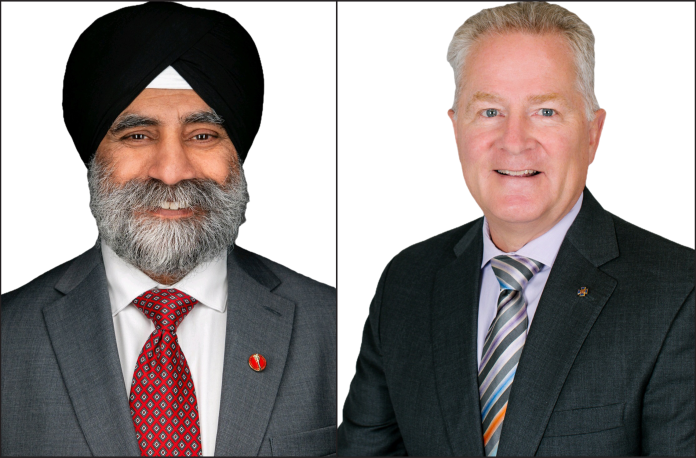Health
Canada Commits Billions to Defence and Veteran Health Support

The Canadian federal government has announced a commitment to increase defence spending to five per cent of the country’s gross domestic product over the next decade. This move aligns with Canada’s obligations to NATO and aims to address the evolving global security landscape. As part of this initiative, Ottawa is urged to prioritize the health and well-being of its most crucial asset: the personnel who ensure national safety and security.
In light of the new challenges facing Canada, the government must focus on investing in organizations that support the physical and mental health of Canadian Armed Forces (CAF) members, veterans, public safety personnel (PSP), and their families. Four key organizations are positioned to make a significant impact: the Canadian Institute for Military and Veteran Health Research (CIMVHR), the Canadian Institute for Public Safety Research and Treatment (CIPSRT), the Atlas Institute for Veterans and Families, and the Chronic Pain Centre of Excellence for Canadian Veterans (CPCoE).
Critical Role of Support Organizations
These organizations operate independently from the government and represent a small fraction of federal spending, yet they play an outsized role in enhancing the quality of life for those who have served. Each organization specializes in different aspects of health and wellness, collaborating to create comprehensive support systems for their communities.
CIMVHR serves as the central hub for scientific research related to military and veteran health in Canada. By partnering with researchers from Canadian universities and international institutions, CIMVHR advances research that ensures CAF members and veterans receive the most effective treatments for service-related injuries and other health challenges.
CIPSRT acts as a national knowledge exchange platform, translating contemporary research into accessible mental health resources. With over 23 per cent of public safety officers potentially suffering from post-traumatic stress disorder or other mental health issues, CIPSRT’s initiatives are vital for maintaining the psychological well-being of current and former personnel.
The Atlas Institute takes a community-driven approach, working alongside veterans and their families to identify mental health challenges such as moral injury and substance use. By providing training in evidence-based therapies, Atlas ensures that service providers are equipped with the latest insights to support veterans effectively.
CPCoE is dedicated to improving the lives of veterans suffering from chronic pain, an issue that disproportionately affects veterans, especially women. By focusing on veterans’ lived experiences, CPCoE addresses the daily struggles related to chronic pain and develops evidence-based management strategies.
Long-term Benefits of Investment
The work of CIMVHR, CIPSRT, Atlas, and CPCoE is crucial for improving the quality of life for CAF members, veterans, and PSP. Their efforts extend beyond direct support, influencing broader Canadian society through forums, webinars, and published research that foster knowledge sharing.
Their contributions have informed government policies, including a recent Standing Committee on Veterans Affairs report addressing challenges faced by women veterans and strategies for their employment. The ongoing research and advocacy from these organizations are expected to yield long-term benefits, improving health outcomes and operational readiness within the military and public safety sectors.
As Canada’s landscape evolves, the need for this essential research and support is more pressing than ever. The federal government’s defence spending priorities should ensure sustained investment in these critical organizations, recognizing that healthier personnel lead to a more resilient nation.
-

 Education3 months ago
Education3 months agoBrandon University’s Failed $5 Million Project Sparks Oversight Review
-

 Science4 months ago
Science4 months agoMicrosoft Confirms U.S. Law Overrules Canadian Data Sovereignty
-

 Lifestyle3 months ago
Lifestyle3 months agoWinnipeg Celebrates Culinary Creativity During Le Burger Week 2025
-

 Health4 months ago
Health4 months agoMontreal’s Groupe Marcelle Leads Canadian Cosmetic Industry Growth
-

 Science4 months ago
Science4 months agoTech Innovator Amandipp Singh Transforms Hiring for Disabled
-

 Technology3 months ago
Technology3 months agoDragon Ball: Sparking! Zero Launching on Switch and Switch 2 This November
-

 Education3 months ago
Education3 months agoRed River College Launches New Programs to Address Industry Needs
-

 Technology4 months ago
Technology4 months agoGoogle Pixel 10 Pro Fold Specs Unveiled Ahead of Launch
-

 Business3 months ago
Business3 months agoRocket Lab Reports Strong Q2 2025 Revenue Growth and Future Plans
-

 Technology2 months ago
Technology2 months agoDiscord Faces Serious Security Breach Affecting Millions
-

 Education3 months ago
Education3 months agoAlberta Teachers’ Strike: Potential Impacts on Students and Families
-

 Science3 months ago
Science3 months agoChina’s Wukong Spacesuit Sets New Standard for AI in Space
-

 Education3 months ago
Education3 months agoNew SĆIȺNEW̱ SṮEȽIṮḴEȽ Elementary Opens in Langford for 2025/2026 Year
-

 Technology4 months ago
Technology4 months agoWorld of Warcraft Players Buzz Over 19-Quest Bee Challenge
-

 Business4 months ago
Business4 months agoNew Estimates Reveal ChatGPT-5 Energy Use Could Soar
-

 Business3 months ago
Business3 months agoDawson City Residents Rally Around Buy Canadian Movement
-

 Technology2 months ago
Technology2 months agoHuawei MatePad 12X Redefines Tablet Experience for Professionals
-

 Business3 months ago
Business3 months agoBNA Brewing to Open New Bowling Alley in Downtown Penticton
-

 Technology4 months ago
Technology4 months agoFuture Entertainment Launches DDoD with Gameplay Trailer Showcase
-

 Technology4 months ago
Technology4 months agoGlobal Launch of Ragnarok M: Classic Set for September 3, 2025
-

 Technology4 months ago
Technology4 months agoInnovative 140W GaN Travel Adapter Combines Power and Convenience
-

 Science4 months ago
Science4 months agoXi Labs Innovates with New AI Operating System Set for 2025 Launch
-

 Top Stories2 months ago
Top Stories2 months agoBlue Jays Shift José Berríos to Bullpen Ahead of Playoffs
-

 Technology4 months ago
Technology4 months agoNew IDR01 Smart Ring Offers Advanced Sports Tracking for $169










